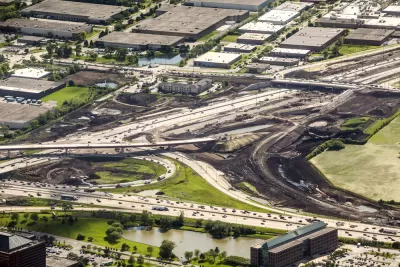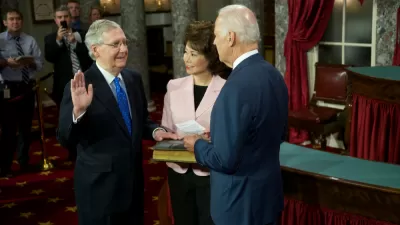President Donald Trump teased the release of his promised $1 trillion infrastructure earlier this month. Here's how a collection of experts reacted to that prospect.

An article for Grist by Nathanael Johnson and Matt Graft surveys a collection of experts on how they would spend the $1 trillion promised by President Trump to fix the nation's infrastructure. According to Johnson and Graft, "just about all" of the surveyed experts "panned Trump's ideas," so the article expresses an awareness that Trump might be over promising on this issue.
The collection of experts includes Lynn Richards, president and CEO of the Congress for New Urbanism; Aaron Renn, senior fellow at the Manhattan Institute; and Charles Marohn, founder and president of Strong Towns, among others.
In a separate article for CityLab, Anthony Flint provides a dispatch from the APA's National Conference in New York City, where Trump's expected infrastructure plans were "high on the agenda." Here, Flint also expresses reservations about the prospects for Trump's infrastructure plan by calling for a "stop-and-think moment." Flint's main concern: that rushing to build "shovel ready" projects will not allow for quality analysis of how projects will perform once they are built. Instead of "shovel ready", Flint suggests the following criteria:
A more cold-eyed approach fully considers the cost of funding, the length of the investment, and the duration of the benefits generated. Planners need to maximize benefits over the full lifecycle of any project, and be mindful of maintenance costs. Additionally, careful consideration should be given to what economists call non-pecuniary benefits and costs—those hard-to-measure ramifications.
Flint suggests more criteria, including resilience and sustainability, and points out some examples from the region and city surrounding the location of the APA's National Conference of how infrastructure projects can go wrong.
FULL STORY: How Trump could spend $1 trillion to fix America if he knew what he was doing

Alabama: Trump Terminates Settlements for Black Communities Harmed By Raw Sewage
Trump deemed the landmark civil rights agreement “illegal DEI and environmental justice policy.”

Planetizen Federal Action Tracker
A weekly monitor of how Trump’s orders and actions are impacting planners and planning in America.

The 120 Year Old Tiny Home Villages That Sheltered San Francisco’s Earthquake Refugees
More than a century ago, San Francisco mobilized to house thousands of residents displaced by the 1906 earthquake. Could their strategy offer a model for the present?

Opinion: California’s SB 79 Would Improve Housing Affordability and Transit Access
A proposed bill would legalize transit-oriented development statewide.

Record Temperatures Prompt Push for Environmental Justice Bills
Nevada legislators are proposing laws that would mandate heat mitigation measures to protect residents from the impacts of extreme heat.

Downtown Pittsburgh Set to Gain 1,300 New Housing Units
Pittsburgh’s office buildings, many of which date back to the early 20th century, are prime candidates for conversion to housing.
Urban Design for Planners 1: Software Tools
This six-course series explores essential urban design concepts using open source software and equips planners with the tools they need to participate fully in the urban design process.
Planning for Universal Design
Learn the tools for implementing Universal Design in planning regulations.
Clanton & Associates, Inc.
Jessamine County Fiscal Court
Institute for Housing and Urban Development Studies (IHS)
City of Grandview
Harvard GSD Executive Education
Toledo-Lucas County Plan Commissions
Salt Lake City
NYU Wagner Graduate School of Public Service





























